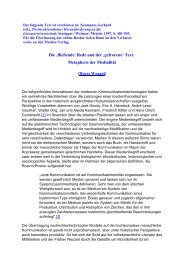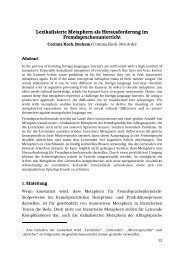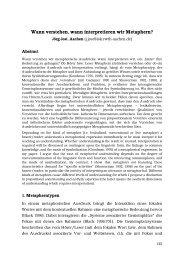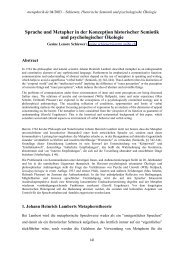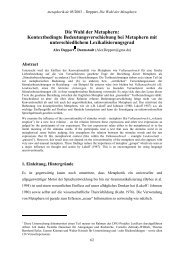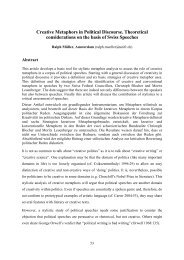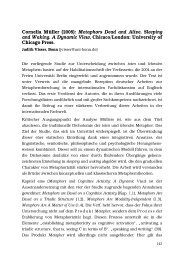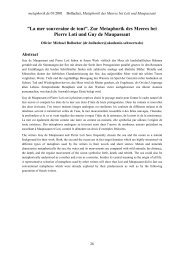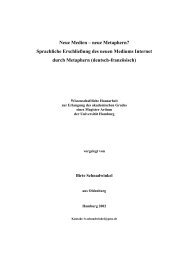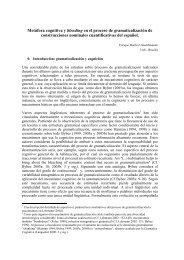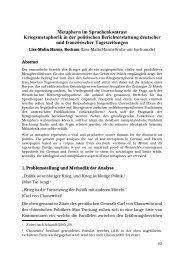The Sweet Smell of Red - An Interplay of ... - metaphorik.de
The Sweet Smell of Red - An Interplay of ... - metaphorik.de
The Sweet Smell of Red - An Interplay of ... - metaphorik.de
Create successful ePaper yourself
Turn your PDF publications into a flip-book with our unique Google optimized e-Paper software.
70<br />
<strong>metaphorik</strong>.<strong>de</strong> 18/2010<br />
although they do not relate to politics but rather to individual people. <strong>The</strong><br />
metaphor is easily un<strong>de</strong>rstandable as something that is in the dark cannot be<br />
seen and those secrets need to stay in the dark so that misdoings are not<br />
revealed or a person’s reputation is not lost etc.<br />
Ze 1981… Mensch Georg Hosch, <strong>de</strong>ssen Einfältigkeit von an<strong>de</strong>ren für<br />
dunkle Geschäfte ausgenutzt wur<strong>de</strong>. …<br />
Wi 1994 sich zu scha<strong>de</strong> sein, dunkle Machenschaften an<strong>de</strong>rer zu<br />
unterstützen, gegen das falsche Spiel<br />
CCM 761 Particularly because they knew these were dark secrets not to<br />
be shared with anyone.<br />
Two more categories can be found <strong>of</strong> which one only seems to exist in<br />
German. <strong>The</strong>y are very different from each other; the first one can be brought<br />
into connection with those dark secrets, while the other one in some way<br />
relates to time, but is entirely different from the above analyzed form. In those<br />
examples where a person is <strong>de</strong>scribed as dunkel, this person is evil and is up to<br />
mischief, this counts for English and German in the same way:<br />
Ze 1982... Doch da passierte es. Drei dunkle Gestalten waren plötzlich um<br />
ihn. ...<br />
CEK 1952 But I suppose everybody has a dark si<strong>de</strong>.’<br />
<strong>The</strong> last usage that could be found in the random concordance lines cannot<br />
clearly be brought into context with the overall negative un<strong>de</strong>rcurrent that is<br />
present in every other weakly synaesthetic metaphorical form, it <strong>de</strong>scribes the<br />
dark beginning. This beginning is simply dunkel because it is a part in history, so<br />
far away from the present, that not much is known about it. Especially the<br />
contrast to the bright future in these examples is really fascinating:<br />
Wi 1983… die Geschichte - als Sphäre <strong>de</strong>r dunklen Ursprünge, <strong>de</strong>r hellen<br />
Zukunft …<br />
All weakly synaesthetic examples have something in common: people seem to<br />
be afraid <strong>of</strong> the dark and thus connect a lot <strong>of</strong> things that cannot be explained<br />
or are terrifying in some way – the very usage that would be expected for the<br />
literal occurrences. Hence, all in all in most metaphorical cases dunkel/dark is<br />
connoted negatively, conveying this uncertainty and the loss or partial loss <strong>of</strong><br />
the most important sense in our culture, while the literal version does not<br />
necessarily relate to something scary, but can simply refer to the lack <strong>of</strong> light.



